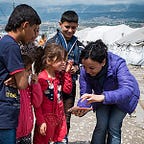Welcome to the APC 2019
What to expect from the 2019 Annual Partnership Consultation
The Annual Partnerships Consultation promises to be a fascinating two days filled with fresh insights and challenging perspectives on some of the key issues facing the humanitarian and food security sectors.
Held since 1995, WFP’s Annual Partnership Consultations (APCs) have become an important date on the development calendar, providing a unique opportunity for WFP and current and potential partners from around the globe to come together and engage in strategic dialogue.
Progress in the fight against hunger has stalled. The forces underpinning this reversal, from armed conflict and population displacement to climate change and natural disasters, are increasingly complex yet confront us all. We must face them together. Collaboration and partnership, and the opportunity to work together across the humanitarian-development-peace nexus, offer a route to building the agile and sustainable programs required to transform the future for the world’s 821 million hungry poor. This year’s Consultation is an opportunity for us to explore in depth the changes we need to implement to achieve our shared ambition of Zero Hunger.
The era of big data and digital technologies offers huge potential to revolutionize the humanitarian landscape and make our work more targeted and effective. But it also has operational and political implications in terms of data sharing and the protection of beneficiaries’ personal information. This is another theme high on the agenda for this year’s Consultation. Together we will be able to work through these challenges and identify the systems and process required to maximize the benefits and minimize the risks associated with harnessing the power of data.
To know more about past years’ Annual Partnership Consultation, read the summary reports below:
2018 APC — The 2018 edition brought together 78 representatives from 56 WFP non-governmental partners to explore ways to improve our common operations in the humanitarian and development spheres. Discussions were held at the level of director of policy, programme and/or operations. Many WFP staff also attended. The agenda was developed in a consultative way and resulted in a series of panel discussions on topics deemed to be the most relevant, with time allocated to questions and answers from participants. Participants were also asked in advance about their expectations for this year’s APC which were considered and addressed whenever possible.
2017 APC — The 2017 event was an introductory opportunity for Executive Director David Beasley to host NGO partners in Rome. Only CEOs or their deputies were in attendance, to ensure high-level policy conversations and a real opportunity for senior NGO leaders to understand the Executive Director’s strategic direction for WFP. Key discussions included the UN reform agenda; famine and early action; the triple nexus of humanitarian action, development and peace; and the impact of the digital revolution on humanitarian action.
2016 APC — WFP’s 2016 APC was about understanding the impact of recent key milestones such as the SDG Summit, the World Humanitarian Summit and the Grand Bargain on NGO partnerships. With more than 60 organizations in attendance, including the presence of 30 CEOs, the APC welcomed new partners, including members of local and national civil society, and faith-inspired groups. UN agencies FAO, UNICEF, UNHCR and OCHA also joined the meetings.
2015 APC — - On 25 November, WFP welcomed a group of international and national NGO partners for the 2015 APC. The purpose of this edition was to seek feedback from partners on WFP’s current NGO engagement strategy. Key outcomes included feedback on engagement plan, capacity building, and joint advocacy.
2014 APC — In 2014 WFP welcomed nearly 60 of its NGO and civil society partners to engage in dialogue on topics reflecting the global humanitarian and development debate. Themes explored were lessons learned from WFP-NGO partnerships in Level 3 emergencies (the most severe, large-scale humanitarian crises), the future of humanitarian action, and implementing the Sustainable Development Goals.
